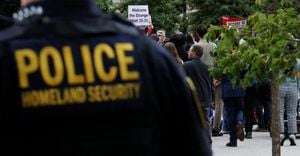The issue of illegal immigration has come to the forefront once again as the Delhi Police took decisive action against Bangladeshi nationals residing unlawfully within the city's borders. On February 1, 2025, authorities reported the deportation of 18 illegal immigrants and the arrests of three individuals, underscoring the heightened scrutiny over foreign nationals living without proper documentation.
According to Dynamite News, the operations stemmed from the need to address increasing concerns about criminal activities linked to illegal immigrants. "DCP Central M Harshavardhan noted, "So far, in the special drive being conducted by the Central District, action has been taken against 21 Bangladeshi nationals who were illegally residing in India. Deportation has been carried out for 18 of them, and 3 have been arrested or apprehended." This initiative forms part of a broader effort by the Delhi Police to root out illegal immigration and the resultant crimes.
Among the recent arrests was the apprehension of three Bangladeshi nationals living with forged documentation, including passports and Aadhaar cards. DCP Harshavardhan revealed, "The latest FIR was registered at Paharganj police station for cheating and forgery. Two Bangladeshi nationals were arrested, and one minor was apprehended. They were found in possession of Indian passports and other identity documents, such as Aadhaar cards and voter IDs. They also have Bangladesh passports. They had entered India illegally 20 years ago." This scandal highlights the complexity and long-standing nature of illegal immigration issues faced by Indian authorities.
The arrests were made after investigations indicated fraudulent activities involving legitimate-looking documents. Further inquiries revealed the presence of a middleman responsible for creating the illegal documentation. The police continue to pursue this individual, emphasizing the systematic nature of the problem. Harshavardhan added, "While the passports appear to be genuine, the documents used to obtain them are fraudulent, and this is under investigation."
Public concern over illegal immigration has mounted significantly, especially following directives from higher officials. On January 20, Delhi's Lieutenant Governor, VK Saxena, expressed disquiet over the involvement of illegal Bangladeshi and Rohingya immigrants in criminal activities. He instructed the Delhi Police to initiate special operations to identify and apprehend such individuals, directing them to implement measures to raise public awareness about the verification of employees and workers.
This initiative was partly influenced by recent incidents reported widely, including one involving actor Saif Ali Khan, who had been the victim of criminal activity linked to a Bangladeshi national. The letter from the L-G's Secretariat stated, "Lt Governor has directed special campaign be launched to identify such infiltrators on a mission mode," indicating the urgency felt by authorities.
The recent events represent more than just routine law enforcement; they speak to the larger discussions surrounding immigration and integration policies within India. Illegal immigration raises significant concerns not only about security but also about the societal impacts within urban communities. The Delhi police have responded by conducting systematic checks, field verifications, and database analysis, leading to arrests and deportations.
One of the notable arrests made during these operations involved Johra Khatoon, who entered India illegally over two decades ago through the Benapole border. She managed to obtain false documents, leading to her acquisition of Indian citizenship via forged documents. A police official stated, "Johra Khatoon illegally entered India through the Benapole border and had been residing in Delhi for over 20 years, procuring her Indian passport using forged documents long before." Her daughter followed suit, securing similar documentation.
Authorities also apprehended Muhammad Ali Amin, another Bangladeshi national who overstayed his visa, with actions taken toward his deportation as well. The situations raised questions about the sufficiency of current immigration policies and the means by which illegal immigrants have historically entered and remained within Indian cities.
Much of the police's focus remains on combatting the forgery of documents, as officials discovered multiple fake identity cards and even passports among those arrested. A full investigation was launched as the police navigate the brave new world of increased scrutiny over immigration status. The pressing question remains: How can India effectively manage its borders and safeguard its identity without infringing on the humanitarian rights of those seeking refuge?
With the operations to identify and deport illegal immigrants gaining momentum, the Delhi Police continue to reinforce their commitment to combating illegal activities associated with foreign nationals. There is cautious optimism among officials as they strive to refine their approach toward managing immigration, but the challenges laid down by ethics, public safety, and national identity remain explosive topics within the nation's discourse.
The urgent measures being undertaken highlight both the complexity of illegal immigrant situations and the necessity for systemic change within immigration frameworks. The Delhi Police's actions could be viewed as merely the beginning of tougher policies and approaches aimed at combating the multifaceted issues surrounding illegal immigration and its often dire consequences for society.



